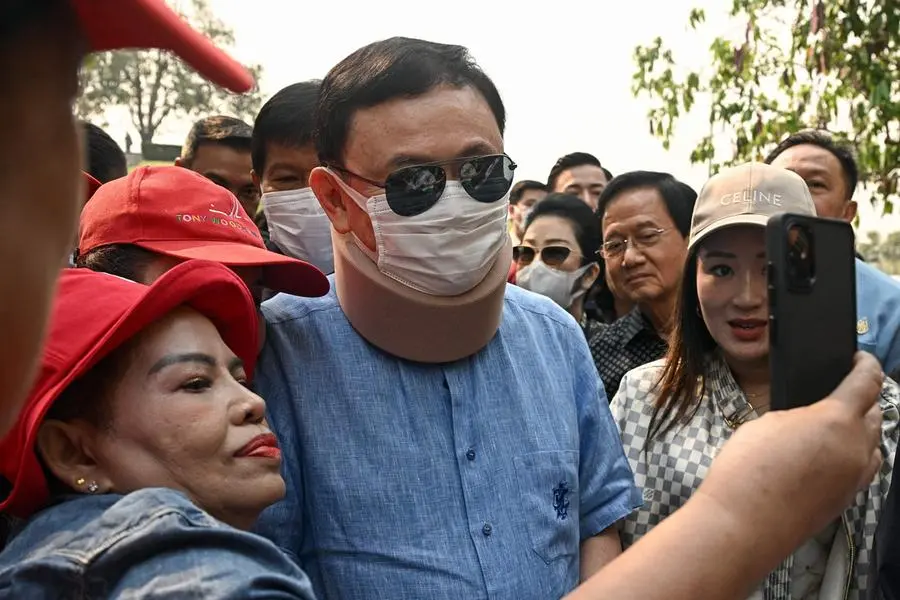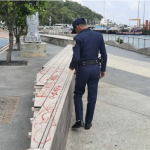The media spotlight has been fixed on Thaksin Shinawatra ever since he returned to Thailand last August after 15 years in exile. That scrutiny intensified on Thursday as the former prime minister began a three-day trip to Chiang Mai less than a month after being released on parole.
Thaksin’s first visit to his home province since being ousted in a coup 17 years ago will reportedly include a merit-making ceremony at a Buddhist temple for his deceased parents and ancestors. He stepped down from his private jet in Chiang Mai on Thursday morning to be welcomed by a group of red-shirt supporters and provincial officials.
Analysts say Thaksin will use the trip to boost support in the city for his proxy party Pheu Thai after its disappointing performance in last year’s general election. The current ruling party won only two of 10 MP seats up for grabs in Chiang Mai, which had been a key stronghold of Thaksin-controlled parties since Thai Rak Thai came to power over two decades ago.
Move Forward grabbed seven of the MP seats in Chiang Mai, while Palang Pracharath won one.
Thaksin’s sights are also set on the next provincial administrative organization (PAO) elections, due early next year, analysts said.
Displaying political clout
Olarn Thinbangtieo, a lecturer at Burapha University’s Faculty of Political Science and Law, said Thaksin’s visit underlines the ex-premier’s strong political influence and behind-the-scenes power.
According to Olarn, Thaksin has displayed his political clout on three levels since returning to his family mansion on February 18: the regional level by meeting Cambodia’s former prime minister Hun Sen on Feb 21, the national level by meeting Prime Minister Srettha Thavisin a few days later, and the local level with his ongoing Chiang Mai trip to meet political allies.
Chiang Mai holds symbolical importance for Thaksin and Pheu Thai, being the place of his birth, a key base of their red-shirt supporters, and the origin of two prime ministers from the Shinawatra clan – Thaksin and his younger sister, Yingluck.
“This visit is aimed at boosting Thaksin’s political power and reviving his popularity in Chiang Mai. He wants to drum up support from red shirts who still love him. Also, it’s preparation for Pheu Thai’s battle for seats in the PAO elections next year,” Olarn said.
The previous local election in December 2020 saw Pheu Thai’s Pichai Lertpong-adisorn win by a slim margin to become Chiang Mai’s PAO chief executive. Next year’s election is expected to be even tougher for Pheu Thai after Move Forward vowed to fight hard for PAO seats.
Rebuilding political network
Thaksin’s Chiang Mai trip is designed to rebuild his political network and reconnect with allies in the hope of restoring his political machine’s once formidable election record, said Stithorn Thananithichot, director of the Office of Innovation for Democracy at King Prajadhipok’s Institute.
The analyst noted that many of Thaksin’s allies in Chiang Mai have now joined Move Forward. Concern is also growing that his old allies from the Buranupakorn clan, which has dominated Chiang Mai’s political scene for years, may partner with the main opposition party in the next PAO election. Former PAO chief executive Boonlert Buranupakorn contested as an independent in 2020 but lost to Pheu Thai’s Pichai.
“To regain his supremacy, Thaksin needs to start with the red-shirt heartlands. If he fails there, it will be more difficult elsewhere,” Stithorn said, adding that the best chance of success for the Pheu Thai patriarch was in Chiang Mai.
‘Big gamble’ for Pheu Thai
Wanwichit Boonprong, a political science lecturer at Rangsit University, points out that Thaksin is closely associated with Chiang Mai, his traditional stronghold. For him, the northern city prides itself on being the origin of two former prime ministers.
“Thaksin’s trip is meant to show that the Shinawatras are serious about Chiang Mai. He wants to snatch back his ‘champion’s belt’ but the PAO election is a big gamble. If Pheu Thai loses, the Shinawatras will have trouble in the national vote,” Wanwichit predicted.
He added that a successful get-together with red shirts in Chiang Mai may lead to similar meetings for Thaksin in other cities with large red-shirt followings, especially in the Northeast.
Thaksin’s charm ‘fading’
Some analysts doubt whether Thaksin’s Chiang Mai trip will yield positive results for him. Olarn said the Pheu Thai patriarch appears to overestimate his political influence.
While Thaksin has retained influence over many politicians and elites, his popularity among grassroots voters has weakened radically compared with his heyday in the early 2000s, Olarn said. Many red shirts are disillusioned with him, while younger voters who grew up during his exile have no strong admiration for the former PM.
There is also a large group of people who will never vote for Thaksin or his proxy party, the analyst added.
These include the royalist yellow shirts, supporters of the People’s Democratic Reform Committee (PDRC), and people dismayed by what they see as Pheu Thai’s betrayal in deserting a Move Forward-led alliance to form a government with the conservative old guard after last year’s general election.
Many others are also unhappy at the apparent double standards behind Thaksin’s treatment after his return. The ex-PM was granted a royal pardon that reduced his prison term from eight years to one and spent the whole of his six-month detention in hospital rather than jail.
“All of these factors make it impossible for Thaksin to sell himself in the political market anymore, although the old conservative political powers still rely on him [as a balance against the reformist Move Forward Party],” Olarn said.
‘Coincidental’ meeting likely
Thaksin will be in Chiang Mai at the same time as PM Srettha, who’s making a work-related trip to the northern city. The prime minister is due to follow up on measures to combat forest fires and PM2.5 smog during his stay from March 15-17. He will chair a mobile Cabinet meeting in nearby Phayao province on March 18-19.
Political observers expect the two to meet while in Chiang Mai. Srettha did not rule out the possibility, but said last week that he had no appointment with Thaksin.
Stithorn forecasts Srettha will invite Thaksin to showcase his strategy for tackling national issues, including worsening air pollution during the current burning season.
Wanwichit points out that this could be the best chance for both men to be pictured together. And the current leader could use the images of unity with Thaksin to help prop up his government’s sagging popularity amid growing discontent, the analyst added.
By Thai PBS World’s Political Desk





